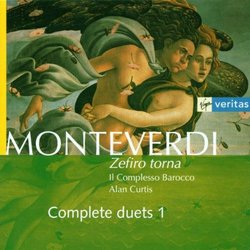I Sink! I Pant! I Tremble! I Expire!
Giordano Bruno | Wherever I am, I am. | 11/08/2007
(5 out of 5 stars)
"Pardon me if I sink into a swoon of erotic ecstacy while I write my review. It might be the natural effect of listening to this CD. Nearly all the poetic texts of these 16 duets are rhapsodies of love, either consummated or thwarted. The poetry is elegant and formulaic, and first-rate if you read Italian. Even in translation the amorous electricity crackles.
But it's the singing that earns the stars...in this case, as many as the first Giordano Bruno perceived in his infinite universe. You think you've heard singing!?! This performance raises the bar. Most of the duets are for equal voices, and those for two tenors are the most impressive. The sheer athleticism of the male singers' voices will cause a paradigm shift in the expectations of most opera lovers. Tenors Luca Dordolo and Gianpaolo Fagotto toss off as many demi-semi-quavers to a beat as any virtuosic violinist, and with perfect intonation and ensemble.
Director Alan Curtis has given the eight singers of Il Complesso Barocco the green light to use every expressive resource of their vocal techniques, every nuance of timbre and dynamic, utter freedom of tempi, diminutions, appoggiature, trills, goat trills, the kitchen sink of historically informed ornamentation, all with sparkle-clean attacks and cadences. By using all Italian singers, Curtis has guaranteed uniform language values; the words are easily intelligible to an Italian speaker. Even for those who don't speak a word of Italian, this uniformity is of value, since all the vowels and all the consonants fit together; you who are singers do know that different vowels tune differently. Once again, pardon me if I swoon about such glorious ensemble singing.
Curtis employs theorbo, triple harp, harpsichord, cello, and organ in various combinations to provide continuo. The continuo is always tasteful and supportive, never obtrusive, never out of synch even with the most drastic rallentando from the singers. A pair of violins also elaborate some of the duets, again with superb ensemble.
These duets are not from a single unified collection but rather are drawn from all the many books of madrigals and other sources of Monteverdi's compositions. Surely they are some of the freshest, most joyful music ever written. If my time-machine ever functions properly and I spend the night in the chamber or Lucrezia Borgia, I want the musicians to perform Monteverdi's "Zefiro torna" while we expire.
This is volume 1 of 2. I've just placed my order for the second disk. The title of my review, by the way, comes from Percy Shelley's long Italianate love-poem Epipsychidion."

![header=[] body=[This CD is available to be requested as disc only.]](/images/attributes/disc.png?v=5b450bfd)
![header=[] body=[This CD is available to be requested with the disc and back insert.]](/images/attributes/disc_back.png?v=5b450bfd)
![header=[] body=[This CD is available to be requested with the disc and front insert.]](/images/attributes/disc_front.png?v=5b450bfd)
![header=[] body=[This CD is available to be requested with the disc, front and back inserts.]](/images/attributes/disc_front_back.png?v=5b450bfd)

 Track Listings (16) - Disc #1
Track Listings (16) - Disc #1